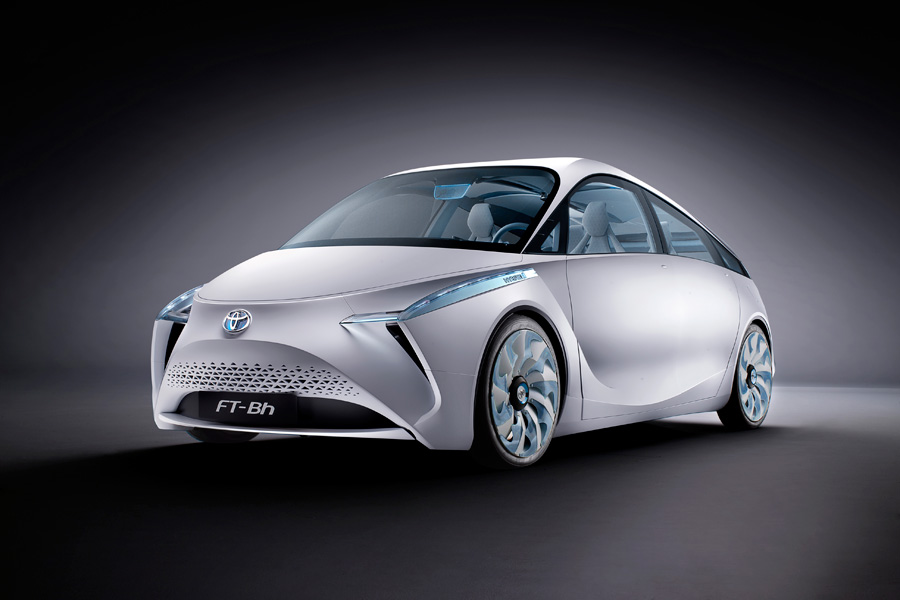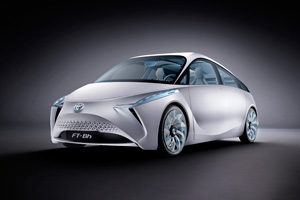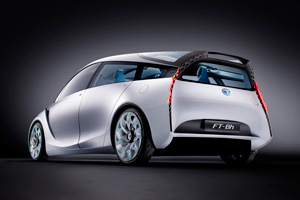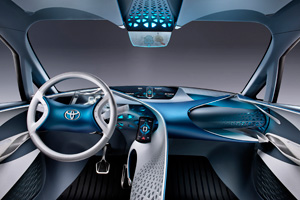Mar. 06, 2012
Next-generation Toyota Small Hybrid Concept Unveiled at
2012 Geneva Motor Show
|
|
| FT-Bh |
By pursuing weight reduction, a more-efficient powertrain and reduced air resistance, the FT-Bh boasts a fuel efficiency of 2.1 liters per 100 kilometers under the New European Driving Cycle (NEDC), with CO2 emissions of just 49 g/km―less than half the current average for B-segment cars.
Adopting a small fuel tank placed under the rear seat together with the hybrid system's lithium-ion battery gives the vehicle a low center of gravity, thus contributing to improved driving performance, which is the basic appeal of any car.
In addition to the FT-Bh on display, TMC has conceived two alternative versions: a compressed natural gas (CNG) hybrid version with CO2 emissions of 38 g/km and a plug-in hybrid version with CO2 emissions of just 19 g/km.
Vehicle Outline
Five Elements of Ultra-Low Fuel Consumption
- Reduced mass
The curb weight3 of the FT-Bh is a mere 786 kg. Assuming a mass-produced fuel-efficient vehicle, the FT-Bh body structure makes greater use of high-tensile-strength steel and does not require expensive materials such as carbon fiber for weight reduction. In addition, a new high-expansion foam material is used inside the vehicle to improve interior thermal management and reduce the weight of interior components. This allows other components, including the body frame, chassis and powertrain, to be made lighter. - Reduced road and air resistance
The FT-Bh seats four adults comfortably in a body that is less than four meters long and that achieves an outstanding drag coefficient of just 0.235. The newly developed Michelin 145/55R18 tires feature a large diameter for effective road resistance reduction, and a narrow width for substantial air resistance and weight reduction. - Highly efficient powertrain
For a high level of fuel efficiency, TMC developed a new, long stroke 1.0-liter, two-cylinder Atkinson cycle gasoline engine that achieves high environmental performance with CO2 emissions of only 49 g/km under the NEDC, along with improved hybrid system efficiency. - Effective thermal energy management
Through the application of high-expansion foam material to interior and weight reduction in the materials used for the seating and interior, the thermal capacity4 necessary for controlling cabin temperature is reduced. In addition, comprehensive thermal management measures have been implemented, such as "air-zoning" that adjusts temperature only in necessary areas depending on the number of passengers. Due to small amount of heat generated by high-efficiency engines, heat from both the engine and exhaust is used for heating the interior. - Reduced power consumption
Power consumption in the FT-Bh has been cut to half that of standard B-segment cars. The adoption of LEDs in the head, tail and room lights, and reduction of standby power requirements necessary for electrical components such as power windows has substantially reduced overall power consumption.
Exterior and Interior Design
Styled under the theme "ecomotion", the FT-Bh boasts a new design that evokes an image of the flowing wind and realizes a high level of aerodynamic performance.
- Exterior
The form of the FT-Bh pursues aerodynamic performance. The bullet-shaped body features sleek, tapered proportions achieved by merging the long roof seamlessly with the protruding windshield, along with narrow pillars that maintain high visibility.
Inheriting elements of Toyota's next-generation "Keen Look"5 styling, the vehicle's front features vertical lamps integrated into the fenders and a large lower grille that has both streamlining and cooling effects. The tapered rear body and slightly concaved rear-end further reduce air resistance. - Interior
The interior design concept features air zoning as well as an emotionally expressive design produced through the "tensional force" of tautly stretched fabric.
Interior upholstery makes use of light and breathable materials, contributing to effective interior temperature management. The ultra-thin shell seats bring a more comfortable ride along with more rear legroom.
Safety-enhancement features include a center display located deep in the dashboard that shows rear views from three body-mounted cameras, and a rear-view mirror with an ambient superimposed display6 that provides information and warnings concerning vehicles reflected in the mirror and also other driver-targeted information.
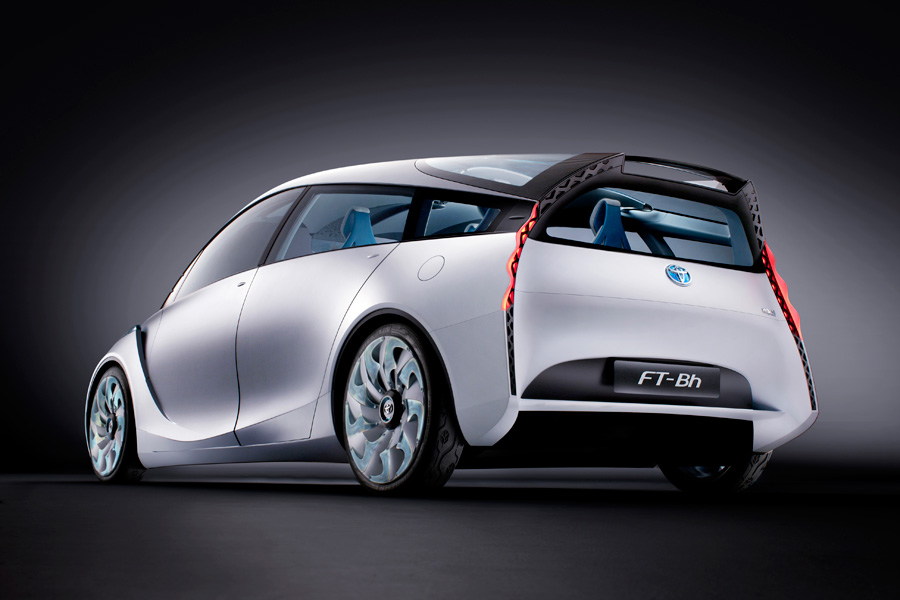
FT-Bh rear view
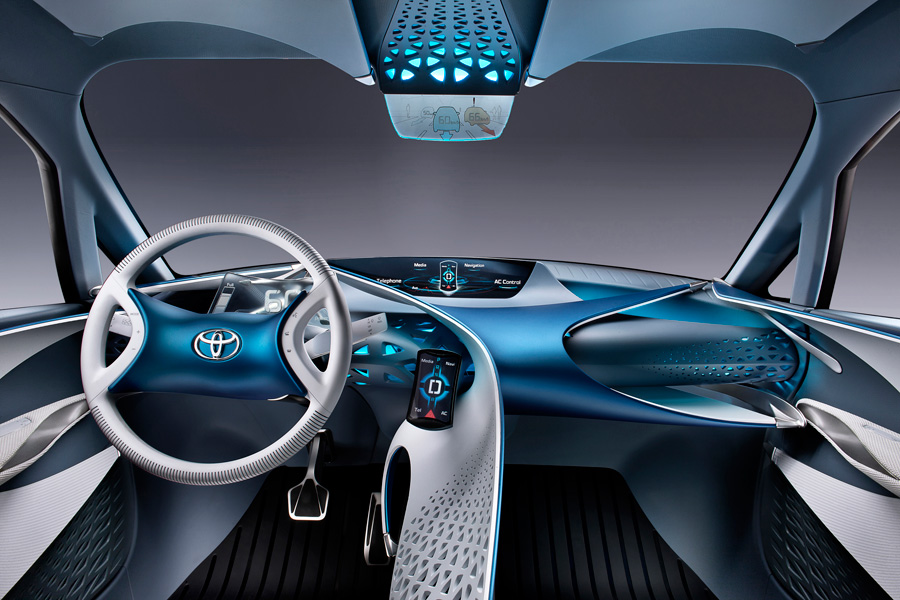
FT-Bh interior view
FT-Bh Main Specifications
| Length | 3,985 mm |
| Width | 1,695 mm |
| Height | 1,400 mm |
| Wheelbase | 2,570 mm |
| Curb weight | 786 kg |
| Tire size | 145/55R18 |
| Seating capacity | 4 |
| Powertrain | THS II with 1.0-liter two-cylinder gasoline engine |
| Driveline | Front-wheel drive |
| Battery | Lithium-ion battery |
1Derived from "Future Toyota B-segment Hybrid"
2Press days: March 6 and 7; public days: March 8 to 18
3Vehicle weight excluding additional weight such as cargo and passengers
4The amount of heat necessary to raise the temperature of an object by 1°C
5Toyota's new way of thinking for front-end design, which three-dimensionally emphasizes the brand emblem while the inverted-"U" shape open bumper combines with the lower grille to create a keen, sharp look
6Based on images obtained from the vehicle's externally mounted cameras of such objects as nearby vehicles, facilities and road signs, essential information can be provided to the driver in an easy-to-understand manner




